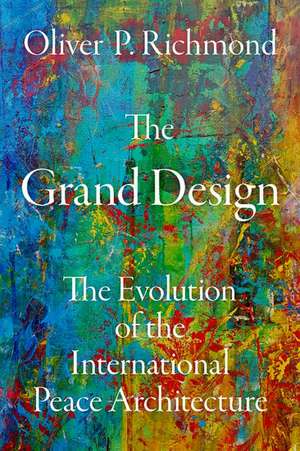The Grand Design: The Evolution of the International Peace Architecture
Autor Oliver P. Richmonden Limba Engleză Hardback – 12 iul 2022
Preț: 438.67 lei
Preț vechi: 486.01 lei
-10% Nou
Puncte Express: 658
Preț estimativ în valută:
83.95€ • 87.32$ • 69.31£
83.95€ • 87.32$ • 69.31£
Carte disponibilă
Livrare economică 13-19 martie
Preluare comenzi: 021 569.72.76
Specificații
ISBN-13: 9780190850449
ISBN-10: 0190850442
Pagini: 320
Dimensiuni: 229 x 152 x 31 mm
Greutate: 0.57 kg
Editura: Oxford University Press
Colecția OUP USA
Locul publicării:New York, United States
ISBN-10: 0190850442
Pagini: 320
Dimensiuni: 229 x 152 x 31 mm
Greutate: 0.57 kg
Editura: Oxford University Press
Colecția OUP USA
Locul publicării:New York, United States
Recenzii
With his wide-angle historical lens, Richmond offers critical reflections on the formation and evolution of the international peace architecture. The breadth of his scholarship and the depth of his knowledge are truly impressive.
In this extraordinary book, Oliver Richmond engages with the intellectual traditions of war and peace to closely trace the evolution of the contemporary, layered peace architecture. Richmond provides profound insights into the complex relationship between power and peace, and exposes counter-peace processes, agents, and frameworks that act as blockages of peace. This book offers one of the best efforts of its kind yet, tracing liberal peace's core ideas from the time of Kant's Perpetual Peace to the convulsions of the current vexed moment.
In an ambitious tour-de-force, Oliver Richmond examines the shifting meanings and practices of peace over several centuries. Written by one of the most prolific and influential scholars in the field, The Grand Design reveals how an 'international peace architecture' emerged from the complex entanglement of peace and war during key historical moments.
In this book, Oliver Richmond once again delivers a text that sets the standard for the field. In an account that is both historically comprehensive and conceptually rigorous, The Grand Design highlights a gap in our knowledge and in so doing acknowledges the dilemmas that are inherent in the search for peace.
In The Grand Design, Oliver Richmond succeeds at his stated goal of illuminating the international peace architecture (IPA) at the macro-level.
In this extraordinary book, Oliver Richmond engages with the intellectual traditions of war and peace to closely trace the evolution of the contemporary, layered peace architecture. Richmond provides profound insights into the complex relationship between power and peace, and exposes counter-peace processes, agents, and frameworks that act as blockages of peace. This book offers one of the best efforts of its kind yet, tracing liberal peace's core ideas from the time of Kant's Perpetual Peace to the convulsions of the current vexed moment.
In an ambitious tour-de-force, Oliver Richmond examines the shifting meanings and practices of peace over several centuries. Written by one of the most prolific and influential scholars in the field, The Grand Design reveals how an 'international peace architecture' emerged from the complex entanglement of peace and war during key historical moments.
In this book, Oliver Richmond once again delivers a text that sets the standard for the field. In an account that is both historically comprehensive and conceptually rigorous, The Grand Design highlights a gap in our knowledge and in so doing acknowledges the dilemmas that are inherent in the search for peace.
In The Grand Design, Oliver Richmond succeeds at his stated goal of illuminating the international peace architecture (IPA) at the macro-level.
Notă biografică
Oliver P. Richmond is a Research Professor in International Relations, Peace and Conflict Studies in the Department of Politics at the University of Manchester, UK. He is International Professor at Dublin City University, Ireland, Distinguished Visiting Professor at the University of Tubingen, Germany, and a Visiting Professor at the University of Coimbra, Portugal. His publications include Peace Formation and Political Order in Conflict Affected Societies and Failed Statebuilding. He is editor of the Palgrave book series, Rethinking Peace and Conflict Studies, and co-editor of the journal, Peacebuilding.
